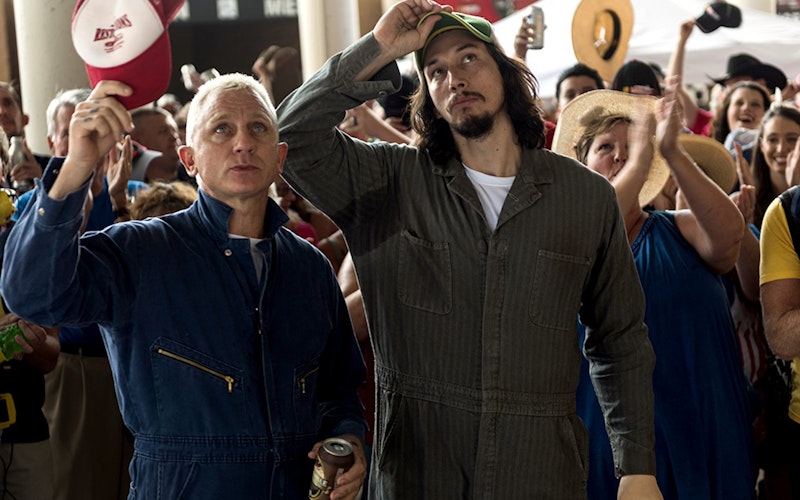
Movies
Logan Lucky: Blessed Are the Luckless?
Before they can join Jimmy Logan (Channing Tatum) in a scheme to rob the vault at the Charlotte Motor Speedway, backwoods brothers Fish and Sam Bang (Jack Quaid and Brian Gleeson) resolutely declare, “We need a moral reason.” Viewers of Logan Lucky also need a moral reason to cheer for these lawbreakers, which wasn’t the case with director Steven Soderbergh’s earlier forays into cinematic crime: Out of Sight and the Ocean’s Eleven series. The easy cool of George Clooney and Brad Pitt was enough to put us on their side.
The heroes of Logan Lucky certainly have their charms. Tatum, along with Adam Driver and Riley Keough as Logan siblings Clyde and Mellie, exude charisma, and there’s an infectious joy to Daniel Craig’s cartoonishly country performance as a third Bang brother: Joe, an incarcerated explosives expert. But these characters would stick out like sore thumbs in a slick Clooney caper. As Clyde explains, his family suffers from a “Logan curse,” responsible for generations of sorrow, including Jimmy’s career-ending football injury and an explosion that took Clyde’s hand.
And yet, we viewers still find ourselves pulling for these unglamorous thieves, precisely because we accept the moral reason the movie essentially offers. Soderbergh weaves into the film reminders of class inequality, whether it be a scene where a racing-team owner (Seth MacFarlane) attempts to exploit Clyde’s injury for his own social-media fame or a montage showing cash from the working-class racing fans literally flowing into a stuffed Speedway vault. Consider also that Jimmy’s limp is unfairly used as grounds to fire him from his job. Try as they might, these characters always seem to be stuck at the back of the line.
As the movie proceeds, it keeps these robbers virtuous despite their scheming. Outside of the central heist and some insurance-covered property damage, they pretty much keep their hands clean. Even a prison riot Jimmy facilitates in order to spring Joe only momentarily hints at violence before switching into a comic set piece, in which the inmates make increasingly ludicrous (and thoroughly harmless) demands. More importantly, the film takes care to show restitution made to any innocents harmed in the execution of the Logans’ plan, reserving suffering only for the wounds that MacFarlane’s boor or Dwight Yoakam’s sleazy warden inflict upon themselves.
Jesus’ kingdom of blessed losers more readily captures the imaginations of those who are already last.
I also felt sympathy for the Logans because in some ways they remind me of certain biblical heroes—those luckless losers God chose instead of the rich and powerful. Consider the way he built a chosen nation from an elderly barren couple or circumvented a powerful city by way of a prostitute’s hospitality. This theme also exists in Jesus’ teachings, which upend our understanding of social order and warn of a rich person’s difficulty entering the kingdom of heaven.
Jesus does not mean here what Logan Lucky sometimes implies, that rich people are inherently evil and the poor inherently good. Indeed, Bible scholars note the early church’s reliance on wealthy Christians such as Joseph of Arimathea and Lydia of Thyatira. It does, however, mean that the poor have literally less interest in worldly power structures. Jesus’ kingdom of blessed losers more readily captures the imaginations of those who are already last.
Logan Lucky most closely echoes this worldview in a crowd-pleasing scene near the climax. Rather than close her beauty-pageant performance with her planned (and sure-to-win) version of Rihanna’s “Umbrella,” Jimmy’s daughter Sadie (Farrah Mackenzie) affirms her bond with her father by impulsively singing John Denver’s “Take Me Home, Country Roads.” Soderbergh’s low-angle camera captures Sadie’s silhouette in the stage lights, framing her as a glamorous pop star, before panning to the blue-tinted crowd singing along. We see a community formed when Sadie forgoes victory for the sake of connection.
The characters in Logan Lucky know there’s something wrong with their world, and they reshape it with a little redistribution of wealth. Christians know there is something wrong with our world, and in a way Logan Lucky inspires us to reshape it by living into the kingdom of heaven—a place where the last shall be first.
Topics: Movies, Culture At Large, Arts & Leisure